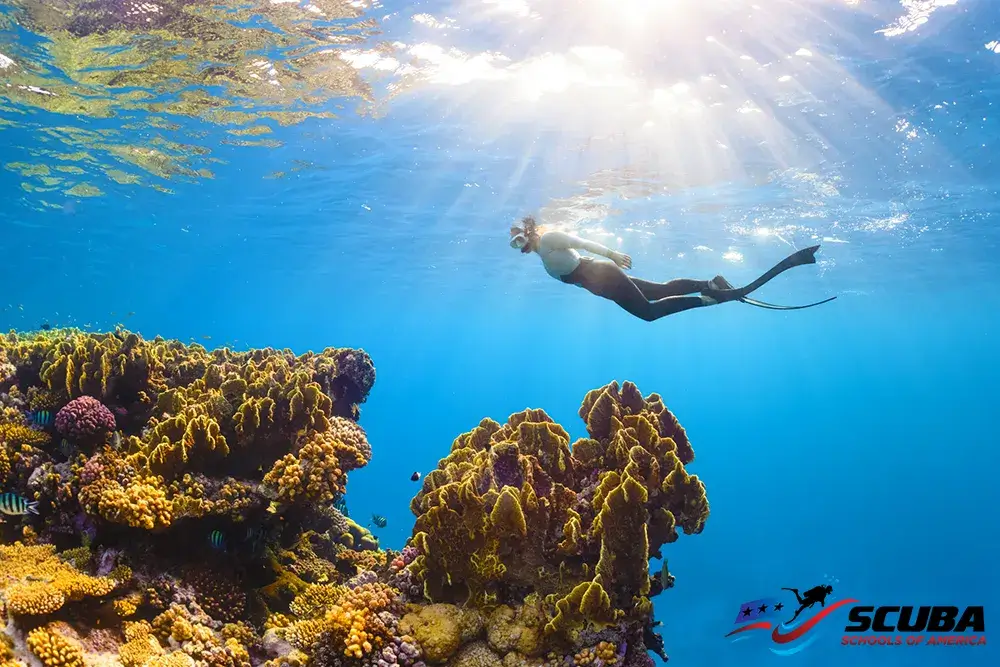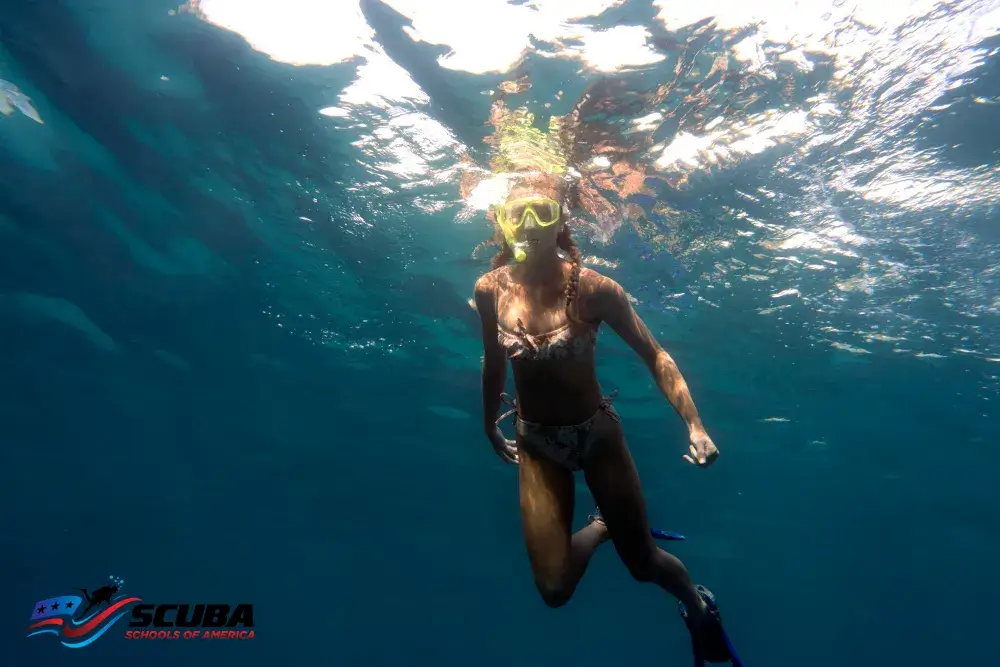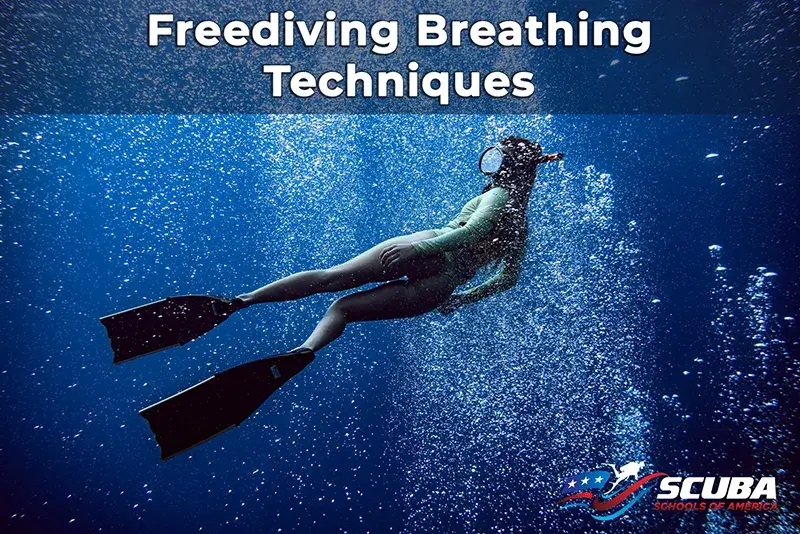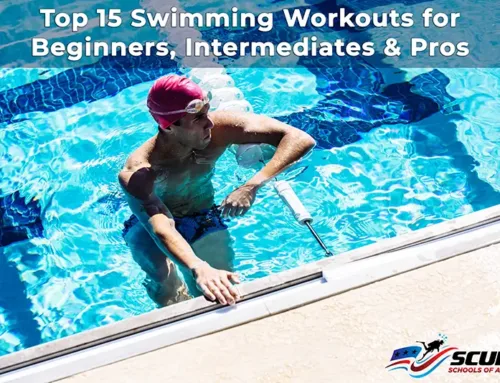Freediving Breathing Techniques: How to Extend Your Breath Hold
Freediving breath training is essential for anyone looking to enhance their freediving skills and explore the underwater world with confidence and safety. By mastering freediving breathing techniques, you can increase your breath-hold time, improve relaxation, and achieve a more comfortable and exhilarating experience underwater. At Scuba Schools of America, we emphasize safe practices and proper training to help you achieve your goals while prioritizing your safety.
All breath-hold exercises should be practiced dry unless you have completed a freediving course and are training with a certified buddy in the water. Safety is the top priority—never dive or practice breath-holding alone.
What is Freediving?
Freediving, one of the oldest forms of underwater exploration, has evolved into a popular sport worldwide. It involves holding your breath and diving without the use of scuba gear or other breathing apparatus. Freedivers rely solely on their lung capacity and proper breathing techniques to explore the depths.
Unlike scuba diving, which requires tanks and heavy gear, freediving is a minimalist activity. With just a bathing suit, mask, and fins, you can experience the freedom and serenity of the underwater world. However, like scuba diving, proper training and preparation are crucial for safety and success in freediving.
Who Can Freedive and How to Improve Your Skills
Freediving, a sport rooted in breath control and relaxation, is accessible to anyone with good health, fitness, and the ability to swim unassisted. Whether you’re new to the water or an experienced diver, learning freediving breathing techniques can transform your underwater experience.
Before starting, consult with a medical professional if you’re unsure about your ability to participate, especially if you have any pre-existing conditions.
Why Work on Your Breath-Hold Time?
Freediving offers a unique experience, distinct from traditional scuba diving. It challenges you to rely on your body’s ability to hold its breath for extended periods, opening up opportunities for deeper exploration and enhancing your underwater comfort.
Improving your breath-hold time isn’t about pushing your limits recklessly; it’s about mastering techniques such as relaxation, mental focus, and physical conditioning. With proper training, you can safely and effectively extend your breath-hold time, allowing for longer, more enjoyable dives.
Whether you’re new to freediving or seeking to elevate your skills, learning proper freediving breathing techniques is the key to achieving greater depths, longer dives, and a safer underwater experience. At Scuba Schools of America, we’re here to guide you on your journey to becoming a confident and capable freediver.
Top 6 Freediving Breathing Techniques

There are several freediving breathing techniques you can use to improve your breath-hold time. By combining physical conditioning, mental relaxation, yoga, and proper nutrition, you can significantly enhance your freediving performance and safety.
1. Proper Breathing Techniques
Mastering proper breathing techniques is crucial for maximizing oxygen intake and preparing your body before dives. This approach can greatly extend the duration of your breath-hold.
An effective pre-dive breathing exercise includes:
- Sit or lie down in a comfortable position.
- Place one hand on your belly and the other on your chest.
- Inhale normally through your nose, ensuring your diaphragm (not your chest) inflates enough to stretch your lungs.
- Pause briefly at the top of your inhale, then exhale slowly through your mouth.
- Repeat for several minutes, maintaining a calm rhythm.
This practice promotes relaxation and oxygen efficiency, key components of freediving breath training.
2. Apnea Training
Static and dynamic apnea training are excellent methods for improving your breath-hold capacity. These techniques help your body adapt to increased carbon dioxide (CO2) levels and simulate real diving conditions.
- Static Apnea: Holding your breath while lying still, either on land or in water, helps build tolerance to higher CO2 levels.
- Dynamic Apnea: Swimming horizontally underwater while holding your breath mimics actual freediving conditions and enhances endurance.
Suggested Routine:
- Practice static apnea regularly on land to get comfortable with longer breath-holds in a controlled setting.
- Incorporate dynamic apnea in a pool or shallow water, gradually increasing your distance or time underwater.
- Train three to four times weekly for steady improvement without overexerting yourself.
3. Physical Training
Physical conditioning is a vital aspect of freediving breath training, as it improves cardiovascular fitness, lung capacity, and overall strength.
Here are some key areas to focus on:
- Cardio Exercises: Activities like swimming, cycling, or running improve your body’s oxygen efficiency, enhancing breath-hold times.
- Diaphragm Strengthening: Exercises such as diaphragmatic (belly) breathing strengthen respiratory muscles, enabling deeper breaths.
- CO2 Tolerance Training: Perform repetitive breath-holds with minimal rest to help your body adapt to higher CO2 levels.
By incorporating these freediving breathing techniques into your training regimen, you’ll not only extend your breath-hold time but also improve your overall freediving safety and experience.
4. Mental Training
The ability to stay calm and relaxed is a cornerstone of effective freediving breathing techniques. Mental training helps divers manage anxiety, avoid wasting oxygen, and maintain focus, making it a vital part of any freediving breath training regimen.
- Meditation: Practicing meditation helps control your mind and body, reducing stress and enhancing your ability to stay calm during dives.
- Visualization: Mentally rehearsing your dives builds confidence and prepares your mind to hold your breath for longer periods.
- Mindfulness Breathing Exercises: These exercises regulate your heart rate, keeping you relaxed and reducing your body’s oxygen demand, ultimately extending your breath-hold time.
5. Yoga and Stretching
Yoga is an essential component of freediving breathing techniques, helping to improve lung capacity, relaxation, and flexibility. Specific yoga practices and stretches can significantly enhance your breath-hold capabilities.
- Pranayama (Breath Control): A fundamental yoga practice, pranayama focuses on controlling the breath to maximize oxygen intake and retention. Techniques like Nadi Shodhana (alternate nostril breathing) improve respiratory function and lung efficiency.
- Apnea Yoga: This specialized practice for freedivers combines breath-hold techniques with physical and mental training, enhancing your tolerance for oxygen deprivation and CO2 buildup.
- Chest and Lung Expansion Stretches: Stretches like cobra pose or bridge pose help increase lung volume, making deeper breaths more achievable.
6. Nutrition and Hydration
A well-rounded diet and proper hydration are critical components of freediving breathing techniques, indirectly supporting your breath-hold capacity.
- Balanced Diet: Foods rich in antioxidants (like fruits and vegetables) reduce oxidative stress, while nitrates (found in spinach and beets) enhance blood flow and oxygen efficiency.
- Hydration: Staying hydrated ensures efficient oxygen transport in the blood. Dehydration thickens the blood, reducing its ability to carry oxygen effectively.
- Meal Timing: Avoid large meals before training or diving, as a full stomach can restrict lung expansion and place additional stress on your body.
By integrating these mental, physical, and nutritional practices into your freediving breathing techniques, you can safely and effectively extend your breath-hold times, improving both performance and overall enjoyment of the underwater world.
What Are the Benefits of Freediving Breathing Techniques

Breathing is something we all do—about 16 times per minute at rest—but have you ever stopped to think about how it works? Our cells need oxygen to survive, which we obtain when we inhale. Simultaneously, we exhale to eliminate carbon dioxide (CO2), a byproduct of cellular processes.
Here’s the interesting part: when CO2 builds up faster than it’s eliminated, our brain signals our lungs to speed up breathing. This is why SCUBA divers are taught, “Never hold your breath.” Holding your breath during a dive causes CO2 to accumulate, forcing your brain to demand faster ventilation. This leads to increased air consumption, which isn’t ideal when you want your tank to last longer.
Benefits of Apnea Training to Reduce Air Consumption
Freediving breathing techniques, including apnea training, can significantly reduce air consumption. Excessive muscle movement, exposure to cold, and stress all contribute to increased CO2 production. To counteract this, divers need to relax, avoid sudden movements, and dive with proper insulation. But there’s more: increasing lung capacity can also make a big difference.
Larger and stronger lungs allow you to manage air more efficiently and reduce the frequency of breaths. Apnea training and breath-holding exercises strengthen lung function and improve oxygen utilization, helping SCUBA divers conserve air while underwater.
Breath-Holding: Other Benefits for Diving
Freediving breathing techniques offer more than just improved air efficiency. They place the body in a natural state of relaxation by activating the parasympathetic nervous system. A 2013 study found that freedivers experience significantly lower stress, anxiety, and negativity compared to non-practitioners. Since stress increases CO2 production, reduced stress translates to slower breathing and greater air efficiency.
Mental Clarity and Self-Awareness
Practicing freediving breathing techniques fosters mindfulness and mental clarity, both essential for SCUBA divers. Staying focused while diving minimizes mistakes and ensures safety. The process also enhances self-awareness underwater, helping divers stay present and in tune with their surroundings.
The Science Behind Deep Breathing
Donald Noble, an expert at Emory University, explains that freediving breathing techniques promote slow, deep breathing that stimulates sensors in the lungs and arteries. These sensors send signals to the brain, synchronizing activity across different brain regions. The result? A serenely alert state characterized by slow, relaxing brain waves.
Improved Mood and Physical Health
Freediving breathing techniques also trigger the release of feel-good neurotransmitters like adrenaline, noradrenaline, and dopamine, improving mood and reducing stress. Freedivers make optimal use of oxygen, benefiting both their underwater and on-land performance. This efficiency leads to a lower heart rate, reduced blood pressure, improved blood flow to vital organs, and overall better health.
How to Hold Your Breath Longer
Improving your breath-hold time requires patience, consistent practice, and a focus on safety. Utilize freediving breathing techniques to gradually expand your limits. Here’s how:
- Document each training session, including the duration of your breath and any sensations experienced.
- Track your progress with specific breath-hold training techniques, such as diaphragmatic breathing or CO2 tolerance exercises.
- Use your training log to monitor your improvements and understand your limits, ensuring a safe progression.
Courses to Enhance Your Breath-Hold
For divers aiming to enhance their skills, SSI offers Advanced Freediving courses that concentrate on improving breathing techniques and physical conditioning. These courses build upon the foundational skills learned in beginner courses and introduce advanced training routines designed to increase your breath-hold capacity.
By practicing freediving breathing techniques and taking a structured approach to your training, you can improve your breath-hold times safely and confidently. Whether starting as a beginner or advancing your skills, freediving offers a unique and rewarding way to explore the underwater world.
Contact Us at Scuba Schools of America
Ready to take your freediving skills to the next level? At Scuba Schools of America, we’re here to help you master freediving breathing techniques, ensuring a safe and exhilarating underwater experience. Whether you’re just starting out or looking to refine your skills, our expert instructors and comprehensive courses are tailored to meet your needs.
For more information about our courses or to begin your freediving journey, contact us today or email us at Scuba Schools of America. Explore a world of new possibilities with Scuba Schools of America!






